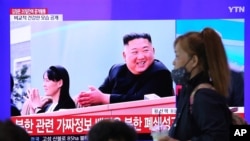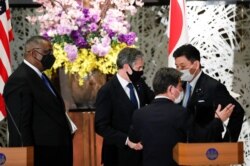North Korea has broken its silence and issued a new warning toward the United States as top American and Japanese foreign policy and defense officials condemn China’s aggression in the region.
Kim Yo-jong, the powerful sister of North Korean leader Kim Jong-un, criticized U.S. and South Korean joint military exercises underway in South Korea.
Her remarks, directed at both Washington and Seoul, were the first official statement made to the nearly two-month-old Biden administration.
Kim’s statement, carried by Pyongyang’s Korea Central News Agency on Tuesday, warned the “new administration” against undertaking “war games” if it wants to “sleep in peace for [the] coming four years.”
Kim said authorities in Seoul could face “consequences” for conducting the drills, which began earlier this month.
The annual maneuvers were scaled down this year due to the coronavirus pandemic and largely involve computer simulations, military officials say.
Kim’s threats come as U.S. Secretary of State Antony Blinken and Defense Secretary Lloyd Austin held security talks Tuesday with Japan’s minister of foreign affairs, Toshimitsu Motegi, and Defense Minister Nobuo Kishi.
Blinken had said earlier the U.S. has recently tried reaching out to Pyongyang but has received no response. He and Austin arrived Tuesday in Seoul.
“We're looking at whether various additional pressure measures can be effective, whether there are diplomatic paths that make sense,” Blinken said.
But while threats posed by North Korea are a common concern for both Washington and Tokyo, the increasingly assertive posture of China was the focus of Tuesday’s bilateral security meeting in Tokyo.
Following talks among the four officials, Austin told reporters the U.S. will work together with its long-time ally to counter what he called Beijing’s “destabilizing actions” in the region.
“We know that competing in today's shifting global dynamics can only be done through the spirit of teamwork and cooperation, which are the hallmarks of our alliance with Japan,” he said.
Tokyo and Beijing both claim possession of a small chain of uninhabited islands in the East China Sea known as Senkaku in Japan and Diaoyu in China.
Foreign Minister Motegi says China has recently altered regulations for its maritime forces that increase the risk of hostilities in the area.
"We [agreed to] oppose China's unilateral bid to change the status quo, including in the East China Sea and South China Sea, and shared concerns about China's coast guard laws,” said Motegi.
Last week, the White House issued a strategy paper that cites China as the primary threat to the current international system and American interests.
U.S. President Joe Biden has not changed many of the Trump administration’s policies toward Beijing. The new U.S. president has maintained trade tariffs, voiced support for Taiwan and has criticized China for alleged human rights abuses.
Robert Dujarric, co-director of the Institute for Contemporary Asian Studies at Temple University’s Tokyo campus, tells VOA News that he doesn’t expect Biden to let up on these issues anytime soon.
“Politically, you don't want to be seen as soft on China,” he said.
Relations with Japan and South Korea were at times frayed during the Trump administration, which criticized Seoul and Tokyo over trade policy and the cost of stationing tens of thousands of American soldiers at bases in both countries.
Reaffirming alliances via the U.S. secretaries’ visits is one way to put more pressure on Beijing and that could make China’s president, Xi Jinping, feel that his regional “containment strategy” is under threat, Dujarric explains.
“Beijing would prefer the relationship between the U.S., Japan and South Korea to be bad because they don't want their adversaries to work closely together, but there's not much they can do,” Dujarric said.
But the U.S. is keeping the door open for dialogue with Beijing.
Following talks Thursday in Seoul, Secretary Blinken is scheduled to head to Anchorage, Alaska, where he will be joined by Biden’s national security advisor, Jake Sullivan, for a meeting with China’s foreign minister, Wang Yi, and Yang Jiechi, a senior Communist Party policy chief. American and Chinese officials have not held bilateral talks since last June.





